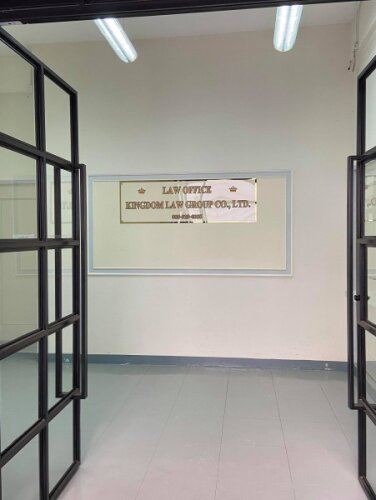Best Accounting & Auditing Lawyers in Watthana
Share your needs with us, get contacted by law firms.
Free. Takes 2 min.
List of the best lawyers in Watthana, Thailand
About Accounting & Auditing Law in Watthana, Thailand
Accounting and auditing laws in Watthana, a vibrant district within Bangkok, Thailand, set the foundation for accurate financial reporting, business transparency, and legal compliance. Adherence to established regulations is crucial for every business, nonprofit, or individual with financial responsibilities. These laws are primarily aligned with national standards but may have considerations unique to the district due to local business activities and the presence of international enterprises. Regular updates and changes to financial reporting requirements mean staying informed is vital for ongoing compliance.
Why You May Need a Lawyer
Legal assistance with accounting and auditing can be essential in many situations. Individuals and businesses in Watthana may seek a lawyer’s help to understand complex regulations, handle disputes, or avoid potential penalties. Common scenarios include:
- Navigating compliance for starting or operating a business
- Resolving tax disputes with the Revenue Department
- Assisting with reports for audits, mergers, or acquisitions
- Managing financial investigations or allegations of fraud
- Ensuring proper record-keeping and meeting Thai financial statement standards
- Preparing for or responding to government inspections
- Advisory regarding cross-border transactions or foreign investment
Qualified legal professionals provide clarity, protect interests, and offer practical guidance tailored to individual or business needs.
Local Laws Overview
Thailand’s accounting and auditing requirements are primarily governed by the Accounting Act B.E. 2543 (2000), the Civil and Commercial Code, and the regulations of the Federation of Accounting Professions of Thailand. In Watthana, businesses must:
- Register with the Department of Business Development (DBD) and obey standardized bookkeeping rules
- Prepare audited financial statements annually, submitted within five months after the fiscal year ends
- Engage licensed auditors approved under Thai law
- Maintain books, records, and supporting documents in both Thai and, if applicable, foreign languages
- Comply with tax filing obligations and cooperate with the Thai Revenue Department on audits or inquiries
Failure to comply can lead to fines, penalties, or even closure orders. Watthana’s international business climate also means special attention must be given to cross-border accounting and auditing practices.
Frequently Asked Questions
What is the deadline for submitting annual financial statements in Watthana?
Annual financial statements must be submitted to the Department of Business Development within five months of the fiscal year end.
Who is required to have their accounts audited in Thailand?
All companies and juristic partnerships in Thailand, including those operating in Watthana, are required to have their accounts audited.
Can foreign-owned companies use non-Thai auditors?
No, all statutory audits must be performed by auditors certified and recognized in Thailand.
Are there specific record-keeping requirements for small businesses?
Yes, even small businesses must keep proper accounting records in accordance with Thai law, though simplified formats may apply under certain thresholds.
What are common penalties for non-compliance?
Penalties may include fines, restrictions on business activities, or temporary suspension of operations, depending on the severity and nature of non-compliance.
Can accounting records be kept electronically?
Yes, electronic record-keeping is allowed provided they adhere to governmental guidelines and can be inspected as required by authorities.
How does a company choose an approved auditor?
Auditors must be approved by the Federation of Accounting Professions and their list is available through the DBD or professional directories.
Are there special rules for foreign investment or multi-national companies?
Companies with foreign shareholding must follow both general and additional requirements, such as enhanced reporting and approvals for fund movements.
Is it necessary to file taxes separately from financial audits?
Yes, tax filings are submitted to the Revenue Department and are a separate legal requirement from the submission of audited financial statements.
What should I do if my business is selected for an audit by authorities?
Consult with a legal advisor or accountant immediately to review your records, respond to notices, and ensure full compliance during the process.
Additional Resources
If you need further help, you may consider reaching out to the following organizations:
- Department of Business Development (DBD) - For company registration and filing guidance
- Federation of Accounting Professions (FAP) - For information on approved auditors and accounting standards
- Thai Revenue Department - For questions on tax obligations, filings, and dispute resolutions
- Thai Chamber of Commerce and local business associations - For networking and practical guides
- Legal aid centers in Bangkok for general legal assistance
Next Steps
If you suspect a need for legal advice in accounting or auditing in Watthana, act promptly to ensure compliance and protect your interests:
- Evaluate your situation and gather relevant documents, such as business licenses, financial records, and prior correspondence
- Consult with a qualified accounting or legal professional who is experienced with Thai business law and regulatory requirements
- Seek recommendations from professional associations or trusted business contacts
- Communicate clearly about your needs, deadlines, and any official notices received
Staying proactive and well-informed will assist you in fulfilling all legal obligations and reducing potential risks linked to accounting and auditing in Watthana, Thailand.
Lawzana helps you find the best lawyers and law firms in Watthana through a curated and pre-screened list of qualified legal professionals. Our platform offers rankings and detailed profiles of attorneys and law firms, allowing you to compare based on practice areas, including Accounting & Auditing, experience, and client feedback.
Each profile includes a description of the firm's areas of practice, client reviews, team members and partners, year of establishment, spoken languages, office locations, contact information, social media presence, and any published articles or resources. Most firms on our platform speak English and are experienced in both local and international legal matters.
Get a quote from top-rated law firms in Watthana, Thailand — quickly, securely, and without unnecessary hassle.
Disclaimer:
The information provided on this page is for general informational purposes only and does not constitute legal advice. While we strive to ensure the accuracy and relevance of the content, legal information may change over time, and interpretations of the law can vary. You should always consult with a qualified legal professional for advice specific to your situation.
We disclaim all liability for actions taken or not taken based on the content of this page. If you believe any information is incorrect or outdated, please contact us, and we will review and update it where appropriate.















